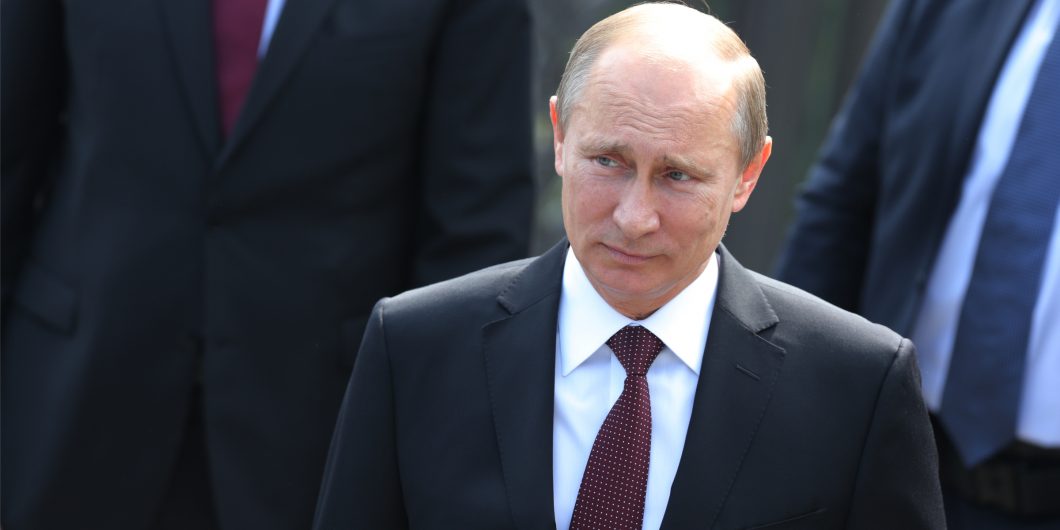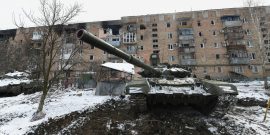Democrats and Republicans in Washington drove each other crazy over espionage 70 years ago. It’s deja vu all over again.
Anatomy of an Ideological Weapon
Charles Clover has written a definitive book about the core elements of Vladimir Putin’s new imperialist ideology. Black Wind, White Snow: The Rise of Russia’s New Nationalism is a comprehensive account of the historical and philosophical roots of Eurasianism.
What is Eurasianism? This theory, whose major promulgators include the Russian authors Lev Gumilev and Alexander Dugin, is essentially a weapon in the hands of the Russian president to justify his military conquests and political irredentism. Some decades ago, Putin saw an opportunity to promote a new ideological colossus to counter the North Atlantic military and civilizational alliance. This ideology, a Russian cocktail of dangerous and inflammatory ideas, takes aim at “American imperialism” above all.
Clover, former Moscow bureau chief of the Financial Times of London, traces its intellectual genealogy with great acuity, by delving into the ambivalent legacy of the 19th century Slavophile movement. His investigation reveals the messianic tendencies of Russian politics, which juxtaposes theological categories like “redemption” and “salvation” with a use of state power that I would not hesitate to qualify as quasi-fascist.
Given the rich ethnic fabric of the countries that, from the October 1917 revolution to communism’s collapse in 1991, comprised the Soviet Union, political leaders after that collapse wanted to unify these diverse peoples in a common aspiration toward a new historical horizon. Dugin, a political scientist at the Moscow State University born in 1962, eschewed the old opposition between communism and capitalism, instead justifying Russian expansionism as a legitimate geopolitical move against Western globalism. To this very day, Putin’s court intellectuals claim that Euroasianism is not equivalent to Russian imperialism, but a serious doctrine meant to combat the homogenizing tendencies of the liberal West. Just as Hitler was wrong to Germanize Europe, Putin would be mistaken, according to Dugin, if he were to merely Russianize the territory of former Soviet Union.
Dugin is very fond of his classical political notion of empire. If Virgil provided Augustus with an adequate ideology (built around the celestial promise of Jupiter to give Rome “sovereignty without end”), Lev Gumilev (1912-1992) generally worked a different theme: he expatiated on the Russian people’s very distinct capacity for suffering (“passionarnost”). This neologism of Latin origin by Gumilev, an ethnologist, translator, and son of the great dissident poet Anna Akhmatova, is key in today’s Russia. It expresses a worldview in which human flourishing, political freedom, or economic success don’t provide a particular nation a sense of self-worth, but the endless sacrifices which, throughout history, the Russian people have proven ready to make.
This is why Vladimir Putin often speaks of the internal energy of the nation, which he says is made evident in the absorption of one’s individual fate into the collective destiny. Neither the creation of wealth, nor the advancement of technology, medicine, or science, can account for the greatness of Russia. What really matters, according to Gumilev and company, is “passionaria,” a moral virtue defined by a passive disposition toward life. They also claim that during the Second World War, an economically inferior Russia defeated a technologically advanced Germany by virtue of “passionarnost.”
Putin has often criticized Western values from the standpoint of a different civilizational paradigm. Clover cites an important 2011 article printed in Izvestia as presenting the Putin vision of a future Eurasian Union bringing together the former Soviet states. Is this mere nostalgia—or an exercise in retro-futurism? Why has Putin so radically rewritten the traditional understanding (so clearly depicted by Daniel Mahoney in his insightful analysis of Alexander Solzhenitsyn’s political philosophy) of Russia and her traditional European roots?
If Putin had accepted the traditional notion of a nation-state, perhaps the invasion of Georgia in 2008, and Crimea in 2014, would not have been justifiable. By invoking Eurasia as the perfect model of unity-in-diversity, the Kremlin can legitimize those aggressions, and the one now taking place in Eastern Ukraine, as well as the hybrid informational war launched in Moldova and other such regions. By incorporating large populations of Russians, Tatars, and other nationalities, the Eurasian empire can always redraw the existing national borders that have been largely accepted by the United Nations Security Council and by the international political order.
Clover seems to believe that, in the case of Ukraine, Putin has executed the very plan which Alexander Dugin described in his 1997 book, Foundations of Geopolitics. Dugin then predicted that the militias in Donetsk and Lugansk would declare their independence and that Russia would even deploy troops on the ground in order to control the region. And Foundations of Geopolitics remains the centerpiece of contemporary Russian geopolitical thinking. Anton Buteiko, the former Foreign Minister of Ukraine, was convinced that his colleagues in Moscow have embraced Dugin’s philosophy and even his military scenarios.
As Clover points out, Dugin describes his theory as an “open source software” that politicians may employ in a general way at their earliest convenience. The trouble is that the good professor, according to Clover, has gotten fairly specific. Dugin “raised money for the revolutionaries” in eastern Ukraine, “offered strategic advice, and campaigned for Putin to send troops in aid to the rebels.” Clover alludes to an interview that Dugin “had given to a Russian news agency, in which he reportedly said on the subject of Ukraine: ‘Kill! Kill! Kill! There can be no other discussion. This is my opinion as a professor.’” This is ironic, since millions of Ukrainians and Russians share not only a quasi-identical language, but also a common spiritual heritage, shaped by the moral institutions of Eastern Christianity.
When it comes to his Eurasian project, Putin sees the Orthodox Church in the same way that Benito Mussolini saw the Catholic hierarchy in the late 1920s: as a means to an end. By invoking some mysterious and inescapable laws of history, Dugin tells the world that political elites are not morally accountable in the same way that ordinary people have to distinguish between good and bad or between right and wrong. This is the quintessentially Gnostic feature of Dugin’s philosophy, which is widely spread within various Russian educational institutions and military academies. It is no surprise that Dugin has appropriated the anti-liberal and anti-Western ideas of Julius Évola and Rene Guénon.
In the same way that F.A. Hayek criticized the outrageous claims to omniscience made by the socialist bureaucrats of the 20th century, one could and should demolish Dugin’s delirious epistemology by showing the intrinsic fallibility of human reasoning in the realm of politics (which can only work on the basis of a “trial and error” model). Dugin is a pseudo-conservative thinker, since his writings lack the virtues of humility and prudence. In the wake of Edmund Burke, all European and North American philosophers of conservative persuasion have emphasized the moral relevance of self-restraint and self-limitation. It is precisely from this standpoint that the Brazilian thinker Olavo de Carvalho (Os EUA e a Nova Ordem Mundial, 2012) has rebutted Alexander Dugin’s dangerous Euroasianism (which still remains the most influential doctrine, as mentioned, among Russian foreign policy and military experts).
Dugin and Putin may have officially parted ways, after the former was, in Clover’s words, “summarily fired from his post as chairman of the sociology of international relations faculty at Moscow State University.” (Apparently this 2014 event stemmed from his unmeasured comments inciting violence in Ukraine.) Nonetheless, Euroasianism remains one of the strongest Russian cocktails prepared in the ideological breweries of Moscow. As long as ordinary civilians and top members of the secret services need to justify the economic backwardness of Russia as compared to its former vassal states—such as the Czech Republic, Estonia, and Poland—Euroasianism will continue to be a useful explanatory concept, as well as a dangerous political weapon (morally responsible, I believe, for the death of democratic leaders such as Boris Nemtsov, who was assassinated near the Kremlin in 2015). People who reject Western values can always embrace the “passionarnost” attitude, by which the individual buries any sense of personal fulfilment for the benefit of an imaginary collective destiny.
As an able correspondent of the Financial Times, Charles Clover has written a well-documented book about the emergence of a new collectivist mindset that contradicts most of the classical Western assumptions about the importance of human dignity, individual property, natural rights, and the limits of government. Sad it is that, as we approach the centenary of the Bolshevik Revolution, so many public intellectuals and political actors from Moscow have forgotten the great luminaries of the pre-1917 Russian liberal tradition, among whom one counts Vladimir Solovyev and Pyotr Arkadyevich Stolypin.
Ideas have consequences, and the concept of Euroasianism currently targets nation-states that are vulnerable, undermined as they currently are by corruption and bad institutional practices. In the past 10 years, Putin has waged a hybrid informational war against the more influential members of civil society living in Estonia, Poland, Moldova, and Romania. The apostles of Euroasianism still use a coded language, as its entire intellectual scaffolding benefits from highly esoteric speculations about the origins of various ethnic groups and cultural traditions. By perverting the humble teachings of Eastern Orthodoxy and by restoring the literary tropes of Romantic nationalism, some imperialist thugs are actively trying to divorce various European nations from their geopolitical alliance with the West.
All of which shows why important decision-makers in Brussels, London, and Washington should read this book.



